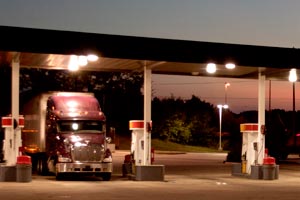Red States Alaska, Oklahoma Seriously Mulling Fuel-Tax Hikes

Oklahoma and Alaska are about as red as states can be. Oklahoma has only elected Republicans to the Senate going back to 1994. Republican Don Young has been Alaska’s only congressman since 1973. However, both states are considering raising fuel-tax rates for the first time since the 1980s.
What’s more, Oklahoma’s proposed hikes of 10 cents per gallon on diesel and 7 cents per gallon on gas — taking both to 24 cents per gallon — were issued by Republican Gov. Mary Fallin. And Alaska’s suggested tripling of its national-low 8 cents per gallon on each fuel by July 2018 came from Gov. Bill Walker, a Republican turned Independent.
“In Oklahoma, we tend to have apprehension about raising taxes,” Mike Patterson, executive director of the state’s Department of Transportation, told Transport Topics and noted that Oklahoma’s diesel tax rate is lower than all but those in South Carolina and Alaska while only the latter has a lower gas tax rate.
Patterson added that Fallin’s proposal is revenue-neutral since it would eliminate the portion of state income tax revenue that ODOT receives each year.
“For decades, we’ve talked about how gasoline and diesel taxes should go to roads and bridges," Fallin explained during her Feb. 6 State of the State address. "My tax reform plan … will ensure taxes associated with roads and bridges are the funding source for maintenance of roads and bridges."
In Alaska, Walker is thinking big because the state has a deficit of about $3 billion. Walker’s proposed increases would boost fuel taxes to 16 cents per gallon on July 1 and to 24 cents a year later. Those figures don’t include the 0.95 cents per gallon environmental surcharge.
Alaska’s House Transportation Committee began consideration on Jan. 31 of Walker’s proposal, which is expected to raise $40 million the first year and $80 million the next. Because that money would be dedicated to transportation, Senate President Pete Kelly termed the hike a “user fee” rather than a tax increase at a Jan. 16 press conference.
“There has been a lot of pushback coming from what we call the Valley, the Palmer/Wasilla area, which has a lot of commuters who drive about 30 to 35 miles into Anchorage every day,” said Aves Thompson, executive director of the Alaska Trucking Association, which will back Walker’s proposal as long as the second 8-cent hike is delayed a year and is part of a larger package of cuts and revenue enhancements. “The legislators are responding to their constituents. Alaskans are absolutely spoiled rotten. We don’t want to pay for anything.”
As was the case when Walker’s proposed doubling of fuel taxes went nowhere in Alaska last year despite a deficit of about $4 billion, Fallin’s suggested tobacco tax increase in 2016 also failed to gain traction in Oklahoma’s legislature.
However, John Cox, spokesman of Transportation Revenues Used Strictly for Transportation, senses momentum now in Oklahoma, where the budget deficit is projected to be $900 million, down from $1.3 billion in fiscal 2017.
“The fact that there are several bills with fuel-tax increases in them is an indication that the topic is on legislators’ minds,” Cox told TT. “That increases the chances that something could happen during the legislative process. Do they embrace it, not embrace it, meet it halfway? It’s way premature to say.”
Cox said his group’s biggest concern is making sure that ODOT’s eight-year (2017-24) plan isn’t affected negatively.
“If the governor’s proposal is adopted, we won’t have to give up anything,” Patterson said. “Last year, we were able to keep all the projects in the eight-year plan going, but we had to delay some of them. If we see a reduction again in this legislative cycle, we will have to remove projects.”
As an independent, Walker, unlike Fallin, doesn’t have a party to fall in line behind him which makes his challenge even greater. It’s also complicated by his desires to adjust the rule on oil and gas tax credits that’s less than a year old and cap Permanent Fund revenues, which topped $2,000 per Alaskan earlier this century, at $1,000.
“I understand the rationale that our fuel taxes are the lowest in the country and that it would be to our benefit to increase them,” Curtis Thayer, CEO of the Alaska Chamber of Commerce told TT. “The issue is that the governor’s numbers keep changing. The fuel tax was supposed to double last year. Now he wants to triple it. I think there’s a lot of apprehension that the numbers keep changing and they’re changing in the wrong direction. It might come out of the [newly Democratic-run] House, but the Senate hasn’t changed much and the veterans are going to be looking hard at the tax issues.”




